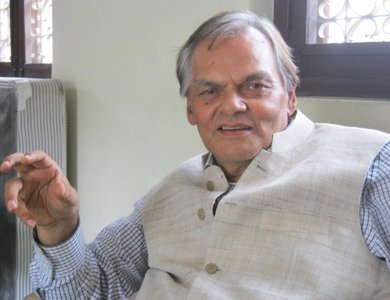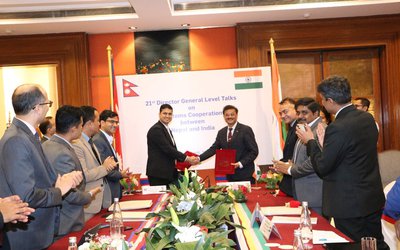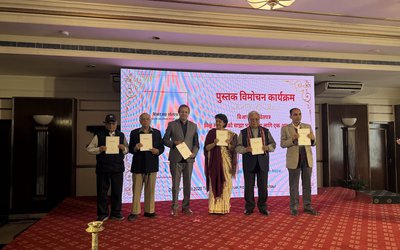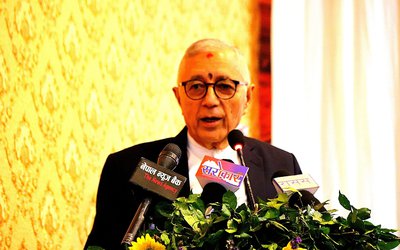
How do you look at the state of Nepalese education?
Nepal's education system has been passing through a very critical time. The recent performance in the School Leaving Certificate exams indicated how the government investment in education was being wasted. The positive side is that the private schools have done really well, showing the success of private investment.
At a time when everyone is criticizing the private sector and calling for nationalizing education, what do you say?
I am not saying that all private schools are doing everything right.
What do you suggest for the improvement of Nepal's education sector?
We need to develop our education sector to meet the aspirations of the 21st century people. The education in 21st century is going to be different than what we have been pursuing right now. The government and policy makers must come up with a new vision and policy for education.
What were your experiences as the minister?
When I took charge as the Minister for Education in 1991, the education system was in a mess and the government was allocating a very nominal budget in the education sector. There was no policy. The curriculum in the Tribhuwan University had not changed much since 2028 and the same was the case with primary and secondary education. There were only two universities and the government was unable to provide the budget to the education sector. The option before me was to invite the private sector in education.
Why did you want such a change?
Because of the lack of budget, the Tribhuwan University and the Ministry of Education were unable to increase the budget to extend the schools and campuses. It is an international norm that the government usually spends more budgets in the primary level of education. However, the situation here was different. The university got a higher chunk of the budget. There is still the demand for more budgets in higher education. The government needs to spend more money in primary education. At a time when the government schools and campuses were unable to provide education to all, we decided to open the private investment in education.
How did you manage the change?
It was a team effort. I had persons like education secretary Ishwori Prasad Upadhyaya, Dr. Tirtha Khaniya and others working in the Ministry of Education. Without their support and help, Nepal's education system could not have changed. After the restoration of democracy in 1990, people had high aspirations. However, Nepal's education system was in a mess, without requisite policy and budget. In that context the need was there find more budget, but the government did not have the money to meet the demand. So, I had no option other than to look support from the private sector. To provide quality education to at all levels, I realized that there was the need to develop a public-private partnership. We introduced a policy inviting the private sector from primary to university level and up providing technical education. When I was the education minister, we had just one engineering college and one medical college.
What changes did your policy bring?
After SLC, parents were compelled to send their children abroad for education, spending a huge amount of foreign currency. We needed to stop this trend. There was a trend that people used to send their children abroad. With an aim to develop education institution in the country to provide quality education, we opened education sector to private investment. Actually, our decision has been paying off. Today, there are half a dozen of universities and a number of medical colleges, engineering colleges, nursing colleges and other schools for higher education to provide quality education. This is a big achievement. There are bad sides also. But the Nepalese need not go abroad for any kind of study, including technical and social. Nepal can be made the center for excellence in education and health sector.
Why are you insisting on the private sector?
The government alone cannot do anything in any part of the world. There is the need of private involvement. Nepal is not an exception. It is a wrong mentality to think that the private sector is the enemy of the people. Actually, the private sector is the friend of the society. No country in the world develops without the private sector involvement. In liberal democratic countries like the United States of America and Japan, the government cannot run businesses. For instance, America's top universities and colleges are run by the private sector. The concept of communist forces seeking government investment in education, health and other sectors is very wrong. The government's role is just that of a facilitator and it can build infrastructure. It is the government’s job to decide the policy.
What should be the other roles of the government?
The government needs to be aware as to how to maintain quality and monitor and regulate the private sector. The government must ensure quality services. Policy, management, monitoring and evaluation are most important in the education sector. We introduced the multi-university concept, university grant commission, and public private partnership in education sector. Nothing has changed in the policy propounded by us. Private sectors are also contributing to improve the quality of education. Private boarding schools are doing extremely well. Even in the recent SLC results, out of 41.57,an overwhelming number students who secured top marks are from the private schools. It is unfortunate that the results of public schools are less than 20 percent. Where has our huge investment gone?
How do you view the government investment in education?
What is the utility to invest money in education sector? Private schools secured the results between 80 and 90 percent. Government investment in education sector is a waste. Only a marginal percentage of students who are studying in the government schools complete the university education. There are less than five percent who pass the 10+12. The enrolment of students from government schools in medical, engineering and other sector is negligible. It is unfortunate that these people work for parties or remain unemployed. Private schools are maintaining quality education. Our students have to compete with international students. It is due to the private schools, the Nepalese students are competing in all sectors. It is the weakness of the policy of the government. Our educationists normally visit the education institutions in different parts of the world. However, they try to copy the education. We cannot transplant education system of other countries.
Don't you think the time has come to change the education policy?
There is the education policy around the world made to meet the demand of the 21st century. Learning to know, learning to be and learning to do. Science and technology has made so much progress that we need to change accordingly. Our new evaluation system introduced in the schools is also faulty. According to the system, there is a mandatory upgrading up to class 7 without any final examination. There is the final examination in class 8 and 9. The provision to attend the test examination before SLC has also been removed. This makes the situation worse. Although there is a provision for unit tests from time to time, the lack of qualified teachers does not permit much to maintain standards. It is unfortunate that Nepal is the only country where a majority of teachers are just SLC-passed. The students who are appearing the SLC the next year are unprepared this year. However, the private schools are taking test after test before examinations. Government schools do not teach in schools but ask students to attend tuition classes.
What was the scenario when you introduced 10+2?
When we introduced 10+2 with an aim to phase out the proficiency certificate level from TU affiliated campuses, no private or government schools agreed to run it. Thus, we decided to start the 10+2 from Budhanilkantha School in early days. The culture of tuition is so rampant that a parent of Pokhara went to Mumbai for work to send his children to tuition. It was shared by education secretary with me just a few days ago. This means: where has our government investment gone? Actually, we have made our high school free.
How did you get involved in the education sector?
I joined the education sector with the inspiration from B.P. Koirala, who always believed that education is the key to all kinds of transformation, including opening the mind of the people. Because of B.P's inspiration, I jumped to the education sector. He suggested I go to villages. I have run a school on my own investment. I have established two high schools and four colleges in Tanahu. I am the founder of Adikabi Bhanubhakta Campus. We opened the college during the Panchayat time. I also taught there for two years voluntarily. I was even detained for running the schools and was transferred to far west. Some of my students are MPs and some of them are ministers. During my five years as a minister, I had changed the education policy with the help of my experience as a teacher. When I was the education minister, there were 92 question papers and I reduced them to 9. I had totally changed the curriculum, making it more timely.
- BIMSTEC SUMMIT: Nepal’s Stand
- Apr 11, 2025
- IME GROUP: Expands Into Paper Industry
- Mar 24, 2025
- CPN UML: Instigated By India
- Mar 23, 2025
- ADB’S CHIEF ECONOMIST: Nepal Reduces Poverty
- Mar 11, 2025
- FM DR. DEUBA: A Successful Visit
- Mar 11, 2025















